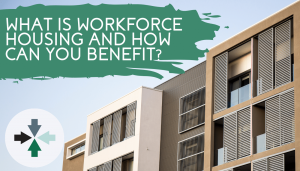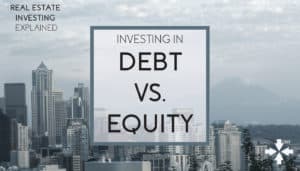FREE TRAINING
What is Real Estate Crowdfunding?
Learn how to build wealth and earn passive income in real estate while someone else does all the work.
When is a Value Add Property a Good Real Estate Investment?
Value-add real estate properties are properties that have yet to reach their full potential. These properties are unable to realize their actual market value for any number of reasons, including poor management, capital-intensive repair requirements, dropping demand for what the property offers tenants, and the list goes on and on.
Before undertaking a value-add property investment, it is important to note that they tend to be significantly more labor-intensive than your average flip and require more expertise than a simple flip.
However, there are many people out there making a lot of money with value-add investments.
In this guide, we will tell you how to identify when a value-added property is a good real estate investment.
What is a Value-Add Property?
Value-add properties are those that need corrective action to reach their full potential value. These properties are riskier and offer better returns than standard, or "core" properties. Properties in this category may suffer from a host of common ailments, including deferred maintenance, below-market occupancy, lease rates below the area norm, and substandard facilities and equipment in need of repair or upgrade.
In order to generate a good return on investment (ROI) with a value-add property, investors must put in capital, sweat equity, or both. Common ways to improve value-add properties include property renovations, both inside and out, management restructuring, marketing efforts, and changing how the property generates income.
These so-called ‘repositioning’ efforts are designed to change the value of the building by increasing revenues by making capital improvements that make the building more attractive to tenants.
Investors who choose to acquire value-add properties need to have many tools in their toolbox. Understanding the physical condition of a property is essential, and a background in construction or architecture is a major plus. Market analysis is another crucial skill, as many of the factors relating to property valuations are outside of your immediate control. Understanding property management, and how to generate and maintain cash flow is also incredibly important.
Benefits of Value Add
The primary benefit offered by value-add real estate investments is the potential boost in ROI compared to core or core-plus properties. Savvy investors can find diamonds in the rough, invest some capital and sweat equity, and turnaround and sell that property, or hold on to it for improved cash flow.
Value-add is a phenomenal way for individual or group investors to leverage their professional experience in the real estate world to generate higher returns than projects without a value-add facet.
Investors in value-add projects also receive the benefits that come with all commercial real estate purchases, including possible appreciation and stable, long-term cash flow. Of course, value-add investments come with a higher risk profile than core or core-plus properties, which we will go into more detail about in the next section.
Get access to our FREE weekly newsletter exclusively covering the latest updates from the real estate crowdfunding world
Risks of Value Add
What sets value-add investing apart from other real estate plays is the fact that they tend to focus on properties in need of improvement, utilize more leverage (debt) than standard real estate investments, and rely on construction and development projects to generate returns.
Construction risk adds significantly to the risk profile of value-add investments. Typically, the more construction or renovation a property needs, the higher the risk.
Less intensive projects like increasing the size of the property, replacing fixtures and building systems, or cosmetic upgrades carry lower risks than full overhauls or conversion projects which change the use of the building. An example of this strategy you should be familiar with is when investors/developers turn former industrial space into loft housing. This is a process known as ‘adaptive reuse’ and these kinds of projects carry considerably more risk.
If you choose to engage in replacing or increasing your tenant base, there are also risks. Actions like raising rents, or enrolling new tenants, may prove to be more difficult than initially believed, which can lead to cost overruns and declining cash flow.
In addition, value-add investments may be more dependent on total returns instead of shorter-term current yields, because price appreciation is often a substantial source of returns for value-add projects. Put another way, on value add deals, the period of construction and improvement is likely to correspond to a period of declining rents while vacant units/space is renovated.
Is Value-Add Right For You?
Value-add investments are available to everyone, but it takes a particular type of investor to flourish with value-add property investments. You probably do not want to start your real estate investment career with a value-add project. While it is possible you will come out of your first deal unscathed, or even with a hefty profit, it is more likely than your project will run over budget, take longer to complete, and, consequently, to underperform.
Remember that value-add real estate investments come with more risk than more traditional core and core-plus commercial real estate.
Most value-add projects range from medium to high risk, so if that is above your level of risk tolerance, value-add might not be for you.
These projects are best left to developers who have experience in dealing with all the moving parts that come with value-add real estate investing. Conversely, investors can gain exposure to value-add properties as a passive investment strategy through a real estate investment vehicle without having to worry about their personal experience detrimentally impacting the project. Whether value-add projects are right for you should be determined by your appetite for risk, and your experience in the world of commercial real estate.
Tax Advantages of Value Add
Investing in value-add real estate offers many tax benefits over other popular investment classes like stocks, mutual funds, and bonds. To start with, a property's depreciation schedule allows investors to claim several tax deductions as long as they hold an ownership share in the property.
The IRS sets the depreciation schedule at 27.5 years and allows investors to deduct 1/27.5 from their taxes each year on property deprecation. In addition, property investors are entitled to deduct the costs of maintenance, day to day repairs, utilities, and other costs of running and maintaining an investment property.
When engaging in new construction or renovations with borrowed funds, you can add the interest you or your company pays on the loan to the basis of your property and depreciate it over 27.5 years, under the same depreciation schedule as standard commercial property, per Internal Revenue Code Section 1.263A-1. Value-add properties are also eligible to be added to a 1031 Exchange to defer taxes on capital gains, which can allow you to reinvest your gains each year, while not having to pay Uncle Sam until you withdraw your investment.
Please note the obvious: As with anything on this website that appears to offer accounting, legal, or investing advice please know that it does no such thing. For accounting and tax, legal, and investing advice, please consult with a qualified professional in those fields.
The Bottom Line
Like any investment, value-added real estate fits well in some portfolios, and not so well in others. Those with an aversion to risk should steer clear of value-added property investments, as their risk/return profile is higher than core and core-plus properties. With that being said, under the right stewardship value-add investments can provide excellent returns and substantial tax advantages when compared to equities, bonds, and other common investment vehicles.
Newbie
If you want to build your wealth and earn passive income from real estate investing and are looking at deals on marketplace platforms or through developers online, then I recommend you start by the 8 Key Financial terms so you can understand every deal you look at.
The 8 Financial Keys are not only a great way to get started, they are also essential to understanding how you’ll make money in any real estate deal.
You’ll learn the most important financial concepts you need to know in real estate investing that apply to every type of real estate no matter the asset class (office, industrial, residential, hospitality, retail).
Intermediate Investor
If you’ve got some online real estate investments under your belt already and are beginning to receive passive income checks each month, or have been paid off with profit – or (hopefully not) are finding that some deals are not quite panning out the way you expected, then check out this page for a wealth of free resources.
Here I cover everything from beginner all the way to very advanced real estate concepts.
You’ll find podcasts with developers, researchers, professors and other industry experts, detailed articles, and lots of videos, both short and long that are all easily searchable and totally free.
Advanced Investors
I am not shy about being straightforward about real estate investing; it is exciting, lucrative, and can help you build wealth and income as part of your investment portfolio, but it is not without its risks.
As an advanced investor you know this already, so I’ve put together a webinar for you that guides you through one of the most important components of real estate investing: Real Estate Contracts – reading between the lines.
This is advanced learning and based off conversations I had with three of the top real estate attorneys in the country, combined with my own personal experience. Access it here; it could be the most important webcast you watch all year.





